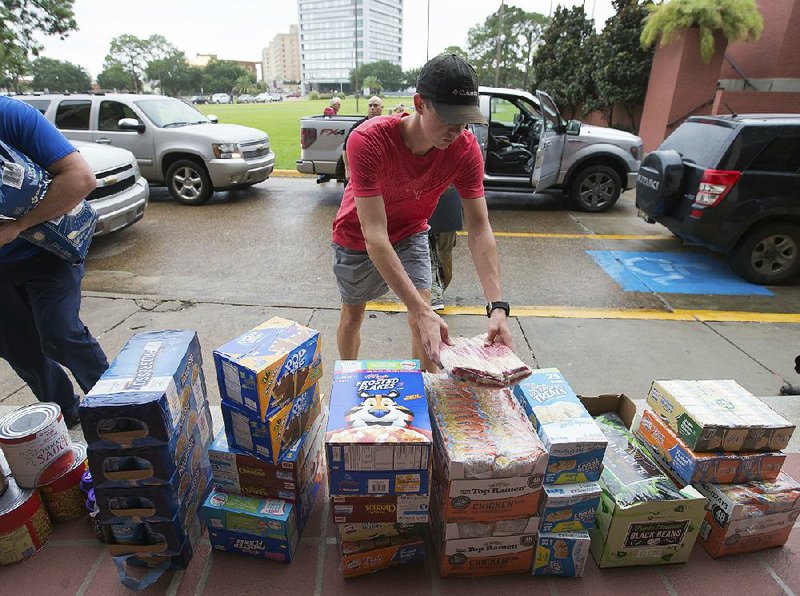Mobile kitchen units, truckloads of tools and thousands of supplies are ready to help people affected by Hurricane Harvey, but there is one problem: They are hundreds of miles away from Houston.
The extent of the disaster caused by Hurricane Harvey and its remnants, which lashed hundreds of miles of coastline from Corpus Christi, Texas, to Lake Charles, La., and flooded more than one-quarter of Harris County, Texas -- home to 4.5 million people -- has made it impossible for relief agencies to help in some of the hardest-hit areas. Trucks now sit hundreds of miles way, waiting for roads to become passable and search-and-rescue teams to finish their jobs.
"The scope and size of the storm is unlike anything the army has ever experienced," said Lt. Col. Ronnie Raymer of the Salvation Army.
Trying to navigate flooded roads and an ever-changing situation as levees breach, rivers overflow and tides change make it too difficult and dangerous to even attempt getting supplies in. The biggest problem is that the storm just won't let up: On Tuesday and Wednesday, the Beaumont-Port Arthur area received more than 2 feet of rain.
"We've got units set up as close as we can," said Mike Ebert, a spokesman for the North American Mission Board of the Southern Baptist Convention. Many of them are in Mississippi. The mission board has deployed kitchens traveling to smaller towns including Rockport along the Texas coast to feed first responders. The units also contain showers and laundry facilities.
Some relief organizations cannot get supplies into Houston, where highways are flooded, and authorities are still searching for and rescuing people from their homes. Organizations that do not help with basic shelter needs will wait until the situation changes from a search-and-rescue operation to a recovery one, to help people with flooded homes.
"What we don't want to do right now is get our volunteers in there and have them get stranded and need to get rescued and create more problems for first responders," Ebert said.
Tim Haas, manager of disaster relief at Samaritan's Purse, said the organization has more than 60 volunteers in Victoria, Texas, and another base of operations in the Portland-Rockport area. Three other disaster relief units -- 53-foot trailers filled with tools -- will be stationed in Baton Rouge and be ready to deploy when it is possible to safely access hard-hit areas.
[STORM TRACKER: Follow Harvey’s projected path]
The organization also has generators and mobile kitchens in Baton Rouge, where it has been active since a round of damaging floods there last year. It is hoping to get a unit to a church in Santa Fe, Texas, between Houston and Galveston.
But the flooding makes even immediate needs difficult to fill. A mobile kitchen capable of feeding 40,000 people a day was expected to arrive at the George R. Brown Convention Center on Tuesday. The center is housing 10,000 people -- double the expected capacity. Its arrival was pushed back at least a day, according to the Red Cross.
"It can be frustrating, as people are wondering: When can we get deployed?" said Bill Bumpas, a spokesman for the Southern Baptists of Texas Convention Disaster Relief.
The magnitude of Harvey has shocked even the most seasoned disaster organizations. Because the storm devastated so many places in different ways, from winds to flooding, the response will be different in each area. And because of its massive geographic reach and impact on the highways and roads, organizations are realizing that setting up one centralized command center won't work.
"We also quickly realized this is going to stretch us more than Katrina did and that we're going to have to begin thinking outside the box in how we move forward, especially in long-term recovery," Raymer said.
Raymer said the Salvation Army is starting to think about opening centers in different neighborhoods because Houston's sprawl was difficult to navigate even before the storm. The organization has opened shelters in the city and a command center in northwest Houston. Raymer was in Rockport on Wednesday, which took a direct hit from the storm. Raymer said it is "devastated" and that he did not see one building that was unscathed.
Now, Raymer and others are waiting to fully deploy in other areas inundated with floodwaters.
Anna Babin, president and chief executive officer of the United Way of Greater Houston, said the organization's 211 help line has had a backlog of 9,000 calls in the queue. Because the storm is still unfolding nearly a week after it made its initial landfall, she is urging organizations to hold off on sending things.
"People keep wanting to send us stuff and bring in trucks and we have to say, 'Wait, where are we going to put these?'" she said. "We're still in the disaster."
RELATED ARTICLES
http://www.arkansas…">Harvey takes parting shots http://www.arkansas…">Harvey jog to spare LR http://www.arkansas…">Flood survivor, 3, clung to mom's body http://www.arkansas…">State’s lawmakers hold mixed views on disaster relief http://www.arkansas…">Give freely, avoid scams, storm-relief donors urged http://www.arkansas…">Harvey to shut largest oil refinery
A Section on 08/31/2017

